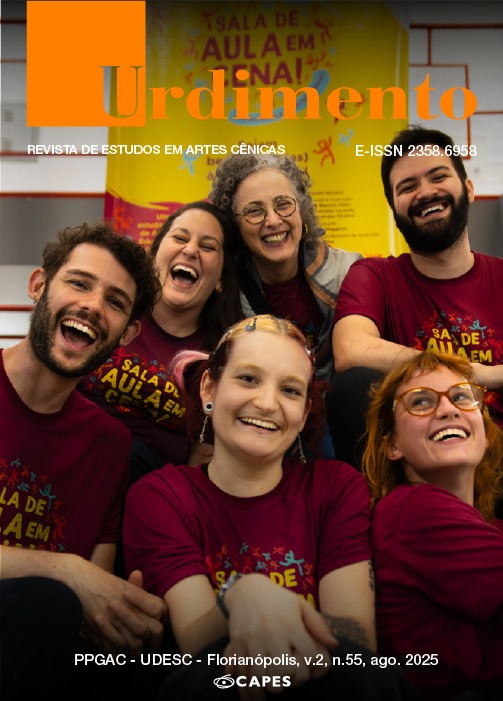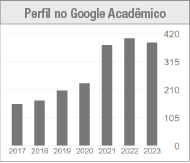Compound stimulus and social belonging: fiction, identity, and bond formation
DOI:
https://doi.org/10.5965/1414573102552025e0107Keywords:
social belonging, memory, drama, identity, theatre educationAbstract
This article investigates how the feeling of belonging can be understood and stimulated through theatrical practices. Focusing on an experience with young athletes from Coritiba Foot Ball Club, the research draws on theoretical foundations related to social belonging and its implications for identity and the formation of affective bonds. Inspired by principles of Drama, the approach used the compound stimulus as a pre-text to provoke immersion in fictional situations, awakening a sense of group belonging. The article argues for the centrality of belonging as a foundation for sensitive, emancipatory educational practices that value each subject’s uniqueness.
Downloads
References
BOAL, Augusto. Teatro do Oprimido e outras poéticas políticas. Rio de Janeiro: Civilização Brasileira, 2005.
CABRAL, Beatriz. Drama como método de ensino. 2.ed. São Paulo: Hucitec, 2012.
Alicerce Educação, c2025. O Alicerce - sobre nós. Disponível em: https://alicerceedu.com.br/sobre-nos. Acesso em: 01 abr. 2025.
GASTAL, Camila A; PILATI, Ronaldo. Escala de Necessidade de Pertencimento: Adaptação e Evidências de Validade. Psico-USF, Campinas, v. 21, n. 2, p.285–292, maio 2016. Acesso em: 03 ago. 2024. DOI: 10.1590/1413-82712016210206
HEATHCOTE, Dorothy; BOLTON, Gavin. Drama for Learning: Dorothy Heathcote’s Mantle of ExpertApproach to education. Portsmouth, NH: Heinemann, 1995.
JESUS, Emanuella de. Dramaturgia e Memória: caminhos para uma Dramaturgia de Pertencimento. In: IX CONGRESSO ABRACE, 2017. Memória ABRACE XVI - Anais do IX Congresso da Associação Brasileira de Pesquisa e Pós-Graduação em Artes Cênicas, Uberlândia, 2017, p. 2852-2874.
NASCIMENTO, Fernando Augusto do. TEATRO E REPRESENTATIVIDADE QUEER: experiências com a metodologia do drama na escola. 2019. 199 f. Dissertação (Mestrado em Artes Cênicas) – Universidade do Estado de Santa Catarina, Centro de Artes, Programa de Pós-Graduação em Teatro, Florianópolis, 2019.
OLIVEIRA, Hugo. Vem Ni Mim Que Eu Sou Passinho. A dança Passinho na confluência entre Redes Sociais, Arte e Cidade. 2017. 137 f. Dissertação (Mestrado em Cultura e Territorialidades) - Universidade Federal Fluminense, Niterói, 2017.
PEREIRA, Diego de Medeiros. Que Drama é Esse?!?: práticas teatrais na Educação Infantil. São Paulo: Hucitec, 2021.
ROCHA, Elizabete Sanches. Diante da Dor Alheia: A Importância do Teatro do Oprimido na Reconstrução do Sentimento de Pertencimento. In: ALVES, Lourdes K; FLORY, Alexandre V; MIRANDA, Célia A. de (Org.) Dramaturgia e Teatro: a Cena Contemporânea. Maringá: Eduem, 2019. p.44-52.
SOARES, Antonio J. G.; MELO, Leonardo B. S. de; COSTA, Felipe R. da; BARTHOLO, Tiago L; BENTO, Jorge O. Jogadores de Futebol no Brasil: Mercado, Formação de Atletas e Escola. Rev. Bras. Ciênc. Esporte, Florianópolis, v. 33, n. 4, p.905-921, out./dez. 2011. Disponível em:
http://revista.cbce.org.br/index.php/RBCE/article/view/902. Acesso em: 24 mar. 2025.
SOMERS, John. Tradutora: Beatriz Ângela Vieira Cabral. Narrativa, Drama e Estímulo Composto. Urdimento - Revista de Estudos em Artes Cênicas, Florianópolis, v. 2, n.17, p. 175–185, 2011. Acesso em: 14 maio 2025.
TAVARES, Rosana Carneiro. O Sentimento de Pertencimento Social como um Direito Universal. Cadernos de Pesquisa Interdisciplinar em Ciências Humanas, Florianópolis, v. 15, n. 106, p.179-201, jan./jun. 2014. Acesso em: 03 ago. 2024.
Published
How to Cite
Issue
Section
License
Copyright (c) 2025 Urdimento: Revista de Estudos em Artes Cênicas

This work is licensed under a Creative Commons Attribution 4.0 International License.
Copyright Statement
The articles published by the magazine are free to use. The copyright is all assigned to the magazine. The articles whose authors are identified represent the expression from the point of view of their authors and not the official position of the journal Urdimento. The author (s) undertakes whenever publishing material relating to the article published in Revista Urdimento mention the said publication as follows: This article was originally published by Urdimento magazine in its volume (put the volume), number (put the number) in the year of (put the year) and can be accessed at:
http://www.revistas.udesc.br/index.php/urdimento
This work is licensed under a Creative Commons Attribution 4.0 International License.




